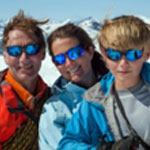- About the ACC
- Membership
- Huts
- Adventures
POLICIES & INSURANCE
- COMMUNITY
- Environment
- Shop
- Give
Winter backcountry travel is exploding in popularity. More people than ever before are taking their skiing outside of resort boundaries. But lacking education and awareness of avalanche hazard can prove fatal for you or for your partners. Completing an AST1 course is now almost considered a mandatory requirement before venturing into the backcountry.
Our 2-day course provides a thorough introduction to avalanche basics and a framework with which to make decisions in the field. We cover the standard curriculum (as outlined by Avalanche Canada). By the end of this course you will know how to identify avalanche terrain, complete an avalanche rescue and how to read the avalanche bulletin so you can start planning your own backcountry adventures.
Instead of a classroom day, this winter we will be doing it through two evening, online sessions during the week before your course. You can choose to do your field day on either the following Saturday or Sunday. This means that you still get a day off while doing the classroom portion at a more convenient time! Click the “Register Now” button to see more details on when the online portions are being offered.
BOOKING INFORMATION
Date:
Online Evening Classroom Sessions
DECEMBER 2ND -3RD, 2024
Field Days:
DECEMBER 7TH OR 8TH 2024
Price: $279 + TAX

MORE INFORMATION
Please try to register online before calling. If you are having issues please try to have your emergency contact information and course questionnaire filled out before calling.
OR Call: (403)-678-3200 ext 213
Backcountry Skiing Hazards
What are the risks
Hazard Mitigation
Hazard Mitigation
Hazard Mitigation
Hazard Mitigation
The ultimate goal of our avalanche training program is for you to make it home safely at the end of your future winter excursions. Our AST1 course lays the foundations of travelling through avalanche terrain by focusing on the following topics:
Unlike some providers, we like to take our AST courses into the field where conditions offer the best learning experience. As well as to the ever-popular Bow Summit, this course could also see you doing your field day in various destinations in Kananaskis. At the end of the course you will receive an Avalanche Canada certificate signed off by your instructor. This is a formal recognition of your training.
*NOTE: You do not need your avalanche gear for the zoom sessions
Our field day will see a maximum participant-to-guide ratio of 6:1 to make for the best possible learning experience!
The Avalanche Skills Training Level 1 Course is open to everyone with an interest in learning to be safer in the winter backcountry. Don’t own your own ski or avalanche equipment yet? No problem, it’s totally okay to take the course with rented snow shoes and beacon/probe/shovel (ACC members get a 10% discount on rentals at Gear Up in Canmore!)
To keep the cost of this camp as low as possible for you, food is not provided on this camp. Be sure to bring along a packed lunch and your favourite snack to fuel the field day!
Accommodation is not included in this course.
We have a dedicated team of instructors (below) who are excited to provide you with knowledge to start of your backcountry experiences safely. We want to provide the best possible learning experience and give you maximum opportunity to ask questions. So for our field day on Day 3, we bring in an extra guide/instructor where necessary to keep participant-to-guide ratios below a maximum of 6:1.
The ACC hires guides certified by the Association of Canadian Mountain Guides (ACMG). Visit the ACMG website to learn more about what they do!

If you don’t have everything on the gear list and aren’t ready to invest in your own, there are many awesome local businesses that rent out all of the equipment you will need. Be sure to reserve your rentals ahead of time to make sure everything you need is available for you when you need it.
Doug Latimer
Doug has 20+ years of guiding experience behind him as an ACMG ski guide and an ACMG apprentice rock guide. As well as his private guiding he has spent a number of years working for the UoC where he taught a range of instructional programs in avalanche training, crevasse rescue and backcountry ski and ski mountaineering. He also somehow finds time to run a multimedia production company! On top of all that, we are lucky to have Doug as our lead winter guide, where he shares his fantastic enthusiasm and extensive knowledge throughout our winter programs.

Black Prince is commonly used as the AST 1 field day location. To find the trailhead, search in Google Maps on your phone For Black Prince Cirque Trail or follow the directions below.

We sell Tugo® Travel Insurance suitable for both ACC Adventures and personal trips:
INCLUDED WITH YOUR CAMP FEE
PARTICIPANTS MUST PROVIDE
ORGANIZING FANTASTIC ACC ADVENTURES FOR OVER 100 YEARS
Input your search keywords and press Enter.